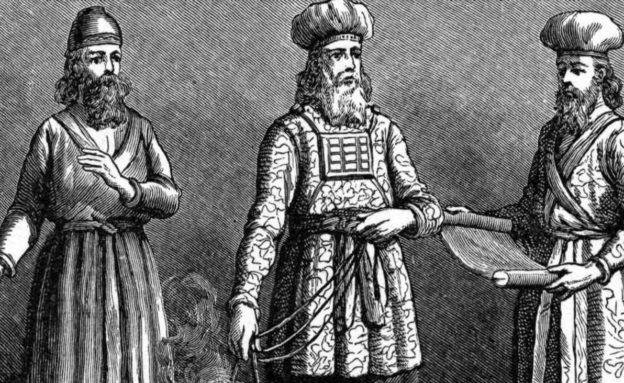My childhood church had a poster in its kitchen with the popular phrase “cleanliness is next to godliness”, encouraging us all to wash our hands and our dishes. Implied in the meaning is that clean hands get us closer to God (though most of us do not mean that when we use the phrase). Still, it is not hard to see the similarity between washing dirt off our hands and the washing away of sins needed to draw close to God.
That link is explored in this section of Exodus, where instructions are given on a bronze basin for cleansing, and anointing items with oil. While the priests were symbolically justified by the altar sacrifices, they still had to be cleansed to come into God’s presence. Also, they and the items needed to be anointed as holy for God’s service. Through this, we are reminded of the importance of our continued cleansing from sin and how we are set apart for God’s service.
The pictures of salvation liberally scattered throughout the Mosaic Law continue with the instruction to build a basin for washing. Like everything else outside of the tabernacle (in the courtyard), the basin was made entirely of bronze and placed “between the tent of meeting and the altar” (vv.17-18).
The basin served a particular purpose. They were to put water into it “with which Aaron and his sons shall wash their hands and their feet” (vv.18-19). The hands and feet symbolised the whole, as these were the parts of the body used to serve God: the hands for doing things, the feet to take them there.
The location of the basin, like anything involving the tabernacle, mattered. It served as a reminder to the priests to wash as they entered and left the tabernacle. This was required every time they did so, and every time they offered sacrifices on the altar (v.20).
This requirement was more than a moral imperative, it was literally life or death. They were to wash “so that they may not die” (v.20). Verse 21 repeats the ongoing instruction to be crystal clear: “they shall wash their hands and their feet, so that they may not die” (v.21).
Why was this so important? When they were ordained, animal sacrifices cleansed them ritually of sin and made them ritually clean and pure for God’s service. But they still sinned, and sin’s effects still dirtied them. They still needed ongoing cleansing to make them holy and fit for God’s service.
The holiness required was reinforced by the anointing oil described in the last part of chapter 30. Everything set apart for God’s service had to be anointed with a special oil, mixed from a variety of fine spices and olive oil (vv.22-5).
With the anointing oil, Moses was to anoint everything in the tabernacle, from the tent itself to the ark of the covenant, the altars inside and out, the furniture, and all the utensils too (vv.26-8). Only holy equipment was allowed to come into touch with the most holy (v.29).
In addition, the oil was applied to the priests. Moses was to “anoint Aaron and his sons, and consecrate them, that they may serve me as priests” (v.30). Because they were holy and anointed, they could touch the holy items and serve in God’s presence.
Because of its significance, the oil use was restricted to the priests, and imitations were not permitted for others (vv.31-33). Nobody else was allowed to use it or wear it, for fear of excommunication or even death. Only those specifically set apart for God’s service.
Both of these pictures teach us about our salvation. Through Christ’s sacrifice, we are forgiven of our sins and declared right with God. But that does not mean that sin and sins’ effects completely disappear immediately (sadly).
Instead, we still do battle every day with sin. And we live in a sinful world, which affects the way we behave, act, and think. All of these things need continual cleansing from our lives, as we turn away from sin and turn towards holiness. All of these things need continual cleansing from our lives each day, as Jesus’ blood washes us clean again when we seek forgiveness of our sins.
The priests needed to be cleansed because their task was important; they came regularly into contact with God and things close to him. The anointing oil, sprinkled over them and the tabernacle items, reinforced the holy realm in which they worked.
We too as believers, justified by God’s grace in Christ and daily washed clean and renewed through the washing of Jesus’ blood, are anointed and set apart by the Holy Spirit for God’s service. So everything we do and everything we have is set apart for God’s service. It does not matter what our role or what our possessions, all are an opportunity to glorify God as we daily come close to him.
Washing your hands will not save you, but Jesus does. And Jesus’ blood continually cleanses us, so we are free to serve God.


